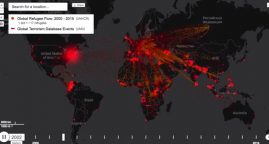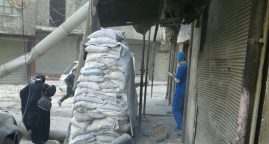Haiti marks 10 year anniversary of earthquake amid worsening food insecurity
Article published on Malteser International website on 01.09.2020 by Katharina Kiecol
Ten years ago, on January 12, 2010, a magnitude 7.0 earthquake struck Haiti, killing more than 300,000 people and leaving over 1 million homeless. The solemn anniversary comes in the wake of urgent calls to action following reports of nationwide food insecurity in the country due to months of drought and political instability; nearly 4 million people are now in urgent need of emergency food assistance. That is one in three people.
In the wake of the earthquake’s devastation, a cholera outbreak claimed nearly 10,000 lives. Haiti, one of the poorest countries in the western hemisphere, is vulnerable to natural disasters and the effects of climate change. In 2016, Hurricane Matthew destroyed 90 percent of the buildings along the country’s southern coast.
Political instability is worsening humanitarian situation
In recent months, Haiti has been engulfed in a deepening political and economic crisis. Sustained anti-government protests, sporadic violence, and political gridlock have had a negative impact on the humanitarian situation. “The local economy has now almost come to a standstill,” said Jelena Kaifenheim, Malteser International’s Regional Manager for the Americas. “If immediate action is not taken, the situation in Haiti will continue to deteriorate. The most important thing now is to meet the emergency food needs of vulnerable people across the country.”
Malteser International – Ten years of aid in Haiti
Malteser International responded to the 2010 earthquake in Haiti, providing life-saving relief and distributing food and water in collaboration with local community partners. In the aftermath of Hurricane Matthew, the organization provided cash assistance to affected families, and distributed hygiene kits to prevent the spread of diseases like cholera. Since then, Malteser International has expanded its aid efforts to include reconstruction or equipping of schools and health facilities, including a maternity ward.
“Despite a series of cholera outbreaks, hurricanes, droughts and food shortages, we have made considerable gains in the communities we work with,” said Kaifenheim. “People see the latrines, trash cans, and water facilities Malteser international has put in place and they value our presence. Our local partners are involved every step of the way.”
Malteser International currently runs community gardens and livestock programs that directly address Haiti’s food crisis. It is estimated that over 50,000 people benefit from these nutrition initiatives. In the rural community of Belle Anse, we recently built a 16 km-long aqueduct that provides safe drinking water to over 20,000 people.
Related Articles
Safe havens: why cities are crucial to the global refugee crisis
06/06/2017. The world is facing unprecedented levels of population displacement. At least 65 million people are on the move, including 21.3 million refugees and 31 million internally displaced persons since the beginning of 2016.
Syria: pediatric hospital supported by Malteser International bombed in Aleppo
11/18/2016. Renewed air attacks on the city’s last pediatric hospital
Record $10 billion pledged in humanitarian aid for Syria at UN co-hosted conference in London
02/04/2016. Ban Ki-moon laid out three main objectives: raising $7 billion in immediate humanitarian aid, mustering long-term support, and protecting civilians.






